#depending on what type of verb it is
Explore tagged Tumblr posts
Text
After the « Nous owoins » it better be, that conjugation is a crime against language.

Linguistics is cancelled
#linguistics#the first person plural conjugation is an absolute sin against humanity#like#depending on what type of verb it is#it would be owons if it’s an -oir verb#etc.#owoins just hurts to look at
142K notes
·
View notes
Text
About how to say "to try" in Japanese
In English, the verb "to try" can have different connotations depending on the context. Among its various meanings are the following:
Experimenting or testing something: this implies attempting to do something to see what happens, often with an open mind and no guarantee of success. For example, "I'll try this new recipe" suggests that you're testing out the recipe, perhaps for the first time, to see how it turns out.
Attempting with effort: this implies making an effort to accomplish something, even if the outcome is uncertain. For example, "I'll try to finish this project by tomorrow" suggests that you're putting in effort with the hope of succeeding, but there's a possibility you might not.
In Japanese, these nuances of "to try" are expressed using different grammatical forms:
1. ~てみる (te miru) This form is used when you want to "try" something in the sense of experimenting, testing, or doing something for the first time to see the result. You use ~てみる when you're not sure about the outcome and want to see what happens, often in a casual or exploratory sense. For example, you use it when trying a new food or testing a new activity: 初めて寿司を食べてみる (hajimete sushi o tabete miru) - I'll try eating sushi for the first time; テニスをしてみる (tenisu o shite miru) - I'll try playing tennis.
2. ~ようとする (yō to suru) This form is used when you're making an effort to do something, with the understanding that the result is uncertain or difficult to achieve. You use ~ようとする when you're expressing your intention to make an effort, especially in situations where success is not guaranteed. For example, you use it when you're attempting something challenging or you're making an effort with uncertain results: 明日早く起きようとする (ashita hayaku okiyou to suru) - I'll try to wake up early tomorrow; 宿題を時間通りに終わらせようとする (shukudai o jikan dōri ni owaraseyou to suru) - I'll try to finish my homework on time.
In the ~てみる (te miru) form, the use of 見る (miru), meaning "to see," suggests that the speaker is metaphorically "seeing what happens" by performing the action. It implies a lower level of commitment to a specific outcome; the action is undertaken with curiosity or a desire to experience something new. The result is not the primary focus; rather, the process of doing or experiencing something is emphasized. In contrast, the ~ようとする (yō to suru) form uses the volitional form よう (yō) to signal a strong intention or will to carry out the action, and する (suru), meaning "to do," emphasizes the attempt. This form conveys a higher level of personal involvement and responsibility, focusing on the effort required to reach a desired goal. While the outcome is uncertain, the focus is on the attempt itself, with an underlying hope or expectation that the effort might lead to success.
In conclusion, we can say that in English "to try" is a verb that must rely on context or additional modifiers to convey whether the action is exploratory or effortful. On the other hand, Japanese uses separate constructions to encode these nuances directly within the verb forms, reflecting a more fine-grained linguistic approach to expressing different types of attempts.
266 notes
·
View notes
Note
Hey! So I’m a fairly new ambulatory wheelchair user with EDS writing about a character who is also an ambulatory wheelchair user. I feel like I keep using the same words over and over to portray movement though (rolled, propelled, “pushed themself,” etc) so I would love to hear if you have any more ideas for alternatives! I’ll take as many as you’ve got!
Thank you!!!
Hello dearest asker!
This is the list that we have provided over time plus others:
Moved/Moves
Went
Wheeled
Rolled
Pushed
Sped/Spun
Propelled
Pulled (by a service animal etc)
Maneuvered
Turn/Turned
Scoot/scooted
Travel/traveled
Rock/rocked
Drove
Crossed
Cut
Stroll/Strolled
Navigated
Drift/Drifted
Swung/swinged
Popped ("Popped up their wheels/chair" to get over a surface etc)
Tip/tipped (Tipped themselves over something etc)
Advanced
Migrate/migrated
Inched
Zoomed
Rushed
Hurried
Raced
Skid
Ram/Rammed
Roamed
Shift/Shifted
Slid (In rainy or icy weather)
Followed
Circled
And a lot of many other verbs that would take me a long time to list! Consider what type of wheelchair the person has, as mention Here. And also how the person moves or places their hands can be another detail to include.
If the actual definition of the verb doesn't involve the specific actions of one or two lower extremities (ex. walk, run, stepped, trot, stride) then it's otherwise good to use! Other words like Moseyed, sauntered, paced, I think depends on the writer. A particularly mischievous character may saunter of a manner in their wheelchair. And a character who is nervous would pace—although possibly tiring—back and forth. And Moseyed, well, I just particularly like this word—but, a character could mosey on by in a certain fashion. Happy writing!
(last ask about verb terminology on wheelchairs per this post we made about it)
~ Mod Virus 🌸
290 notes
·
View notes
Text
How To Fucking Write: a guide by fairyhaos

[masterlist]
this post details:
DIALOGUING INTERESTINGLY

hi gays and gals! the first post on starting and pacing a story did really well, so "how to fucking write" is back, with yet more advice and tips for everyone ^^ please feel free to let me know if there's something you want me talk about, because i'll be more than willing to see if i can help. also a reminder that i have a taglist for this series as well, and please reblog if you find this helpful :)

# - HOW TO DIALOGUE.
.. bullet point one : grammar
okay guys, as a native english speaker, i'll be the first to tell you that this language fucking sucks in terms of its grammar, but when it comes to dialogue, understanding how it works even to some extent will help you branch out and vary the way you write dialogue, which makes it so much more interesting.
with dialogue tags (said, asked, etc) if the punctuation mark in the dialogue is not a ! or ? then it should be a comma.
example : [junhui + castle]

as you can see in the first line, a comma is used rather than a full stop, because the sentence hasn't been finished yet. there's a dialogue tag, ('you correct'), that comes after it. and since the pronoun 'you' isn't a proper noun (i.e. a name) then it shouldn't be capitalised, because, again, the sentence hasn't been finished.
with action tags however, (he smiled, he stood up, etc) then it should be a full stop.
example : [i just made one up bc i don't use this a lot lmao]
"I disagree." He stood up, and walked over to close the door. "This isn't safe. You shouldn't go alone."
and now, since there is a full stop, it indicates that the speech is a sentence all by itself. that means the next word ('He') ought to be capitalised.
but the key part when grammar-ing dialogue in order to make it interesting depends on where you put the action and grammar tags.
if you constantly have lines that are just:
"dialogue," he said.
"dialogue," she said.
"dialogue but a bit longer," he said.
... then it can get repetitive, and annoying. by varying your dialogue structure, it can create more interesting dialogue.
example : [minghao + password]

there's a variety of dialogue and action tags being used with each line of dialogue, preventing everything from sounding too repetitive.
the first line starts with a normal sentence, and an action tag. the second is a standalone line of dialogue with no tags. the second has the action tag in the middle of the dialogue. and the last has a dialogue tag in the middle of the dialogue.
by varying the ways in which you write your dialogue, it makes everything a lot more interesting.
.. bullet point two : verbs and adverbs
the easiest way to make dialogue interesting, though, is to use fancy words.
this can be by replacing 'said' with a range of other dialogue tags (see this really comprehensive list for a whole variety of different words), but i'd advise against overusing these. 'said' is your friend! it's the invisible dialogue tag, helps your reader read through your dialogue in comfort, but of course, if you wanna add a nuanced way of describing the dialogue, then replacing 'said' is the easiest way to make your dialogue interesting.
but don't overuse these. for me, i'd focus on action tags and adverbs.
use interesting adverbs that add description to how a character is saying something can go miles. and using action tags that break through what could have been a long section of characters just talking? it helps so much.
i'd recommend having onelook thesaurus open as you write. you don't have to type in just words: phrases, the overall vibes of the word you're thinking of, all of that can be typed into the thesaurus and they'll provide you with pretty good results each time.
it also really helps when you've forgotten a word and can only remember vague bits of what the word should feel like.
.. bullet point three : voices
the best way, however, is ultimately to create a character. write a personality for them, bring them to life, think about the way in which they would talk and then put that down onto paper.
it's difficult, perhaps the most difficult to do, because it's also so tricky to advise someone on how to do this. it's all about the character you want to create, the personality you envision for them, and the only person who can fully write that is you.
however, i would find a few 'ticks' of theirs and use them as indicators in your writing.
for example, in my seoksoo long fic, seokmin's tick is that he always "chirps" what he's saying. and beams. a lot. this identifies his character, makes him unique(ish), and establishes his personality and differs him to the other characters.

but ultimately, it comes down to word choices, when you're writing a character voice.
like, your character describing something with elegant, floral language vs them going "this is so pretty". or perhaps making them stumble over their words when they're panicked vs them simply just going silent when they're flustered.
it's about being specific. about making choices with your words that would have english teachers analyse and unpick your writing, hundreds of years later.
(even if it's fanfic. especially if it's fanfic: because who knows how many fans may join your fandom in the next few years?)

... and that's it ! if anyone has anything else they want advice on (how to structure, how to write dialogue, how to plan etc) then just shoot me an ask, because i'd love to help however i can :)
tagging (comment/send ask to be added!): @selenicives @stqrrgirle @weird-bookworm @eternalgyu @blue-jisungs (tough luck guys btw but youre gonna be tagged in this entire series ehehehe)
#a guide by fairyhaos#fanfic#svt fanfic#svt fic#seventeen#txt#svt#seventeen fanfic#fanfiction#writing#creative writing#writers of tumblr#writing prompt#writeblr#writing community#tomorrow x together#txt x reader#svt x reader#kpop writing#ao3#ao3 writer#ao3 fanfiction
725 notes
·
View notes
Text
Scary scary German syntax... right?
The following sentence exhibits a typical mistake German-learners make: Heute ich gehe in ein Museum.
It's not conjugation ("ich gehe" is correct!), it's not declension ("ein Museum" is correct too!). The issue is "heute ich gehe". Correct would be: Heute gehe ich in ein Museum (or: Ich gehe heute in ein Museum.)
What's the rule here?
It's unfortunately not simply "there can only be one word before the verb"
German word order is so difficult be cause it is so variable. All following sentences are correct and synoymous (though emphasis shifts):
Der Opa schenkt seiner Enkelin zum Geburtstag ein Buch über Autos.
Seiner Enkelin schenkt der Opa zum Geburtstag ein Buch über Autos.
Ein Buch über Autos schenkt der Opa seiner Enkelin zum Geburtstag.
Zum Geburtstag schenkt der Opa seiner Enkelin ein Buch über Autos. All mean: The grandfather gifts his niece a book about cars for her birthday.
What do they all have in common, syntax-wise? There's only one phrase in front of the finite verb. What does this mean? A phrase is a completed (!) unit that can consist of one or more words (depending on the word class (-> noun, verb, …)) Typical word classes that can be a phrase with just one word are:
Proper nouns, plural nouns, personal pronouns, relative pronous (Lukas kocht. Busse fahren. Ich schreibe. Der Mann, der kocht, …)
Adverbs (Heute, Morgen, Bald, Dort, Darum, …) Most other word classes need additional words to form a full phrase:
adjectives need a noun and article: der blaue Ball, der freundliche Nachbar
nouns need a determiner (= article): der Mann, eine Frau, das Nachbarskind
prepositions need… stuff (often a noun phrase): auf der Mauer, in dem Glas, bei der Statue
…
A finite verb is the verb that has been changed (=conjugated) according to person, time, … All verbs that are NOT infinitive or participles are finite. ich sagte -> "sagte" is the finite verb ich bin gegangen -> "bin" is the finite verb The infinitive and the participle are called "infinite verbs" and are always pushed towards the end (but not always the very end!) of the sentence: Ich bin schon früher nach Hause gegangen als meine Freunde.
So: Before the verb (that is not the participle or infinitive) there can only be one phrase.
Since "heute" is an adverb (-> forms a full phrase on its own) and "ich" is a personal pronoun (-> forms a full phrase on its own), they can't both be in front of the verb "gehe" You have to push one of them behind the verb: Heute gehe ich in ein Museum Ich gehe heute in ein Museum.
Both of these are main clauses (Ger.: Hauptsätze), which in German exhibit "V-2 Stellung", meaning the finite verb is in the second position (after one phrase).
What happens if we push all phrases behind the finite verb?
Gehe ich heute in ein Museum? (Watch out: Gehe heute ich in ein Museum would be ungrammatical! The subject has to come in the second position)
It's a question now!
In German, question sentences (that do not start with a question word like "Was?", "Wo?", …) start with the finite verb (called "V-1 Stellung").
Questions, main clauses,… what's missing?
Dependent clauses!
The third type of sentence exhibits "V-letzt Stellung" or "V-End Stellung", meaning the finite verb is at the very end of the sentence. Ich bin gestern in ein Museum gegangen, … main clause -> V-2 Stellung … weil es dort eine interessante Ausstellung gab. dependent clause -> V-letzt Stellung If you want to practice this....
... determine if the following German sentences are correct. If not, what would be the right way to say it?
Der Zug war sehr voll.
Gestern ich war in der Schule.
Die Lehrerin mich nicht hat korrigiert.
Gehst du heute zur Arbeit?
Das Buch ich finde nicht sehr interessant.
To practice this further, translate the following sentences into German and focus on the order of words:
The boy gave the ball back to me.
I called my girlfriend because I missed her.
The girl saw her brother at the train station.
The horse, which was standing on the field, was white and black.
#it's definitely not easy#but you can totally learn it!#maybe you'll notice it from now on#don't worry if you still get it wrong though#that's completely normal#and you'll still be understood#being understood is the main goal of learning a language!#german#learning german#langblr#german langblr#deutsch lernen#deutsch#language learning#german language#german learning#language#german grammar
223 notes
·
View notes
Text
writing realisations that helped me
(please keep in mind that I am just a hobbyist having fun- also writing advice is not one size fits all! use what works best for you!)
language will differ depending on the narrator- for each of my stories, I like to have the narrator or focus character have a distinct voice which will appear in the word choice, sentence structure and the similes/metaphors they use. I find it fun to spread hints of who they are as a character in the way they tell the story!
active verbs can help your narrative feel more present and intense
consume media you love to get inspired, and write the type of story that you love to read!
getting out of the house and seeking new experiences are also good sources of inspiration- try to take walks frequently, go to local museums/events etc
please please please please please prioritize your mental health when creating. burnout is not fun; remember to take care of yourself!
happy writing everyone!
#writeblr#writers on tumblr#writing#writing inspiration#creative writing#writers and poets#writerscommunity#writing thoughts#writing things#writing advice#writing in general
43 notes
·
View notes
Note
hi, person from infodump question here again! i feel like im being nosy but i couldn't help but notice those little symbols near each character on the ref sheets and that they seem to have a pattern to them. i did decipher the easy ones, like the top elements being the species, the elements of each crown, the little circles at the top of the desciples' symbols, but that's pretty much it. if it isn't spoilery, i would love to see the system of these symbols! it seems very intricate and intentional, like those half-sun elements have different number of x-es at their sides depending on what character we're looking at
if you don't want to reveal this yet it's completely alright, just know that i noticed aha
hehehehehe You fool! YOU'VE ACTIVATED MY TRAP CARD ANON-FROM-INFO-DUMP-QUESTION! YOU HAVE NO CHOICE BUT TO READ MY RANT ABOUT THE WRITTEN LANGUAGE I MADE FOR LAMB! HAHAHAHAHAH You won't need to know this language to understand THaB. It's more for flavor and world-building, so you will see the language in the comic, but if asked, I will give the translation! This language is not very developed, I didn't really have the occasion/time/energy to use it extensively- There are problems with it, things will change over time, but this ask is the occasion to put down what I've got, nice and clean! Thank you very much to @wowowhy and @greenycartoon for your precious help✨ _ _ _ _ _ A BIT OF CONTEXT: This language has no spoken form, it was made to keep/give simple informations and/or orders. It is exclusive to Lamb and their disciples, as nobody else knows how do read it. Very useful to have secret/private written instructions to not cause a fuss in the flock. Context and interpretation are an important part of reading, as this language is not as precise as our modern languages.
HOW TO READ:

The text is written on a straight line, called the guide. It crosses symbols/glyphs throughout the whole sentence. It starts at the base of the first glyph, and ends by crossing the last.
(The post is REALLY long, so Imma put the magic "Read More" button here- I will put the symbol's lexicon at the very end)

-Head/person glyphs are NEVER crossed by the guide, no matter where you put them. It represents sentient beings, and can be customized to match the person's specie and/or looks. -Place Glyphs are pretty vague, and are not really used on their own. -Particles are additions to symbols to give more (often abstract) information. They can change the meaning of the glyph/verb they are attached to. -Punctuations and Regular Glyphs are pretty self explanatory. Punctuations are attached to the guide, unlike Particles which are attached to glyphs. To make a plural of a Regular Glyph, just put it twice, using the guide as a symmetrical axis. _ _ _ _ _
SUBJECT: It is always first in a sentence, and the guide starts from it. There are multiple different structures to format a subject:

-You can use a single glyph (fig.a) for simple concepts, otherwise you use a 3 Part Subject (fig.b). - For the 3 Part Subject, you start with the glyph of the head/object/type of place you are talking about. Then you use the other 2 slots to describe it further by adding other glyphs. The order is important, and there are different kinds of structures.

1- If you put a Head glyph first, followed by a glyph representing an object, and then nothing, you're describing the person's job. 2- A Head glyph in first slot and a Place glyph in last indicate the person in charge of the place. 3- An empty first slot with a Place glyph at the end gives a specific location. The middle slot indicates what this location is about. You don't need to fill the 3 slots. Just add a little line to the unused slot. -The 3 Part Subject with the "hats" is a Cartouche (fig.c), you use those to write names! Cartouche are a bit of an exception to the importance of placement and which glyph goes before/after which. The focus is more on the individual glyph rather than its interactions. You always put a Head in the first slot, then 1 to 2 glyphs signify important features. (The 3 slots limit can be broken if needed, but it's not common. Don't be like him.) -The Closed Cartouche (fig.d) is an abridged version of a cartouche . You don't really want to write the full cartouche again and again, so you can take a Closed Cartouche, and put the most recognizable glyph. (Often, it's the Head glyph, but if there are multiple names with a similar Head glyph, you could use another glyph of the cartouche)

_ _ _ _ _

VERBS: symbolized by a sideways parenthesis that includes the next glyph. This combo gives you a verb. If the action influences something/someone, you put the influenced concept after the verb's glyph, and then you close the verb. You always close your verb, except if it is at the end your sentence. In this situation, you leave it as is.

Some verbs have multiple uses, and change meaning depending on the structure. Here we have the verb "give", that becomes "exchange". The meaning changes when you add a comma (green) after the verb, and it is followed by the object being exchanged. The glyph of the person being interacted with is put at the end.

Particles give the state of what it's attached to, and can be attached to every glyph. Here you have the use of particles on a Head glyph (ex.1), and a verb (ex.2).

When half a particle is used to describe a physical attribute, write it down as you would if that person is facing you. Ratau and Loki's left eyes are injured, but in the cartouche, its inscribed as the injured eye on your right. _ _ _ _ _
PUNCTUATION:

Question Marks are the only instance where the first glyph is not the subject.
Commas are used to indicate a pause between parts of a sentence or separating items in a list. With commas, you can have multiple verbs, and/or multiple concepts that the action influences in one sentence. A lack of commas is the end of a list.
If/Then Commas are used to indicate the influence of the first part of the sentence onto the second. It can replace "Because" "So" "Therefore" ect.
Time arrows are used to indicate when a sentence is temporally affected by the Past/Future, but can also be used as a particle. Time Arrows follow the sentence they influence. They ends when you finish a sentence, or at a comma. When ending at a comma, if the rest of the sentence is still affected, you need to draw the arrow again. The Continuous Arrow (following the guide) is a special kind of Time Arrow, used to symbolize an action lasting in time. _ _ _ _ _
NUMBERS:

Numbers act like normal glyphs, but with the additional dots to indicate the beginning and end of it.
_ _ _ _ _
LEXICON:




#cabi ask#thab au#through hell and back cotl au#cult of the lamb#long ass fucking post#wowhy#greenycartoon#conlang
52 notes
·
View notes
Note
I do a lot of Dungeons & Dragons, and I have fairly regularly used the conceit that various cultures draw from various real-world historical cultures and languages.
There is a species in D&D called "dragonborn". I decided that Sumerian would be a reasonable source for this species (especially given some of the lore associated with this group as having had a major empire in the deep past), e.g. I use names from the Sumerian king list for dragonborn characters. (Dragonborn are humanoids who were created by or descended long ago from real dragons.)
But "dragonborn" is incredibly bland and generic and of course would not reflect their own name for themselves. So I found a Sumerian vocabulary list (transliterated not cuneiform), and found "ushu, ushud" for dragon, and a word for "slave", or "servant" or something like that, which seemed to be interpretable as "lower class born", with a -tud element in the last place. I was way out on a limb here, but I combined the two to make "ushutud", which is at least a lot more interesting than "dragonborn".
So the question is: What would you suggest for a Sumerian noun that has similar meanings and connotations as "dragonborn"?
Thanks!
Hello! I'm not sure what wordlist you're using but it's slightly off - the word I know for "dragon" is ushum or ushumgal ("great ushum"). (Ushu means "caterpillar" or "sunset, eveningtime" depending how it's written, and ushud would mean something like "prayer pasture").
Tud is a verb meaning "to be born" (along with other meanings), and it is used at the end of a few words meaning "born as..." - for example, an amaatud (or emedu) was a slave born (tud) to an enslaved mother (ama), in contrast to someone enslaved at a later point; while an urtud was a type of domestic slave or indentured servant, perhaps one who was born in debt (ur) and would work until the debt was paid off. I could see it being used for "born of...", but my first thought on seeing ushumtud would be that it's a "person enslaved due to having a dragon for a parent".
Instead, the more neutral (and frequently-used) way I'd express this uses dumu, the word for "child" or "descendant", as the root noun. My translation would be dumu-ushuma or dumu-ushumgala "descendant of dragon(s)".
Or a worldbuilding thought - dumu-ushumgala could work as the neutral-to-positive general term ("dragonborn"), while ushumtud can coexist as a derogatory term ("dragonspawn"?) Thanks for your question, and let me know if that works for you!
41 notes
·
View notes
Text
this is absolutely a conversation that would need a lot of collaboration with Black communities, Black Jews and Black yiddishists but it would be so great to see some Yiddish language content about Black foodways and cooking demonstrations and such. (For more on the topic of Black and Jewish and Black-Jewish foodways please see Michael twitty!) One thing I noticed while writing a letter to a friend describing soul food I’d eaten on a trip was how many words related to these topics differ from standard German or Germanic vocabulary - not hugely a surprise given that the agricultural and natural terminology in Yiddish tend to be where a lot of the Slavic vocabulary is
Disclaimer that what you see below is a mix mainly of the comprehensive modern dictionary, words I’ve heard used in modern non chasidic yiddish communities, Yiddish language books and my own experience and that all of the following is subject to vary esp depending on where the dialect of Yiddish originated
anyway there’s:
נשמה-עסן )neshome-esn (soul food, likely a modern calque from English but it’s sooo great). Hebrew word “neshome” for soul + Germanic “Esn” (food)
מאַסלימקע - maslinke - Slavic - buttermilk
סמעטאַנע- smetane- Slavic - sour cream
פּאַפּשוי - papshoy- Romanian - corn
פּאַפּשויברויט - papshoybroyt- cornbread
אוגערקע - ogurke - Slavic - cucumber
די זויערע אוגערקעס - di zoyere ogurkes (the pickles)
ארבוז (Arbuz- one of many but the word my grandmas family used) - Slavic - watermelon
טשאָלענט - tsholent - probably an old Romance language like old French - the super thick comforting shabbes stew
אָזשענע - ozhene -Slavic - blackberry
באָב - Bob - Slavic - bean
קאַבאַק - kabak- possibly Russian but from a Turkic language - squash
מאַמאַליגע- mamalige - a Romanian type of cornmeal pudding or mush
באַמיע- bamye- okra - from Ottoman Turkish from either Persian or Arabic
חזיר - khazer - pig (from Hebrew)
חזיר-פֿלייש - khazer-Fleish - pork
פּאָנטשקע - pontshke - Slavic - donut
מאכל - maykhl - dish/treat - from Hebrew
מסיבה - mesibe- party - from Hebrew
שימחה - simkheh- party - from Hebrew
סודה - sudeh- feast - from Hebrew
Some other useful/related vocabulary here too:
שמאַלץ - shmaltz - chicken fat - from old German, no idea how this might be used in modern German dialects
משפחה - mishpokhe - family - from Hebrew
קהילה - kehile- from Hebrew - there are a bunch of words for “community” in Yiddish with different nuances, this is one I hear a lot from modern Yiddishists
אבֿות - oves- literally “fathers”, ancestors, from Hebrew
ירושה - yerusheh- inheritance - from Hebrew
ירשענען - yarshenen - to inherit - Hebrew root with German verb structure
40 notes
·
View notes
Text
So I've seen some discussion about the way Mammon talks in 24-11, and how some think Asmo forced Mammon to speak this way while others think it might be because of a issue with the translation. And since I speak some Japanese, I figured I'd break down what's actually going on here
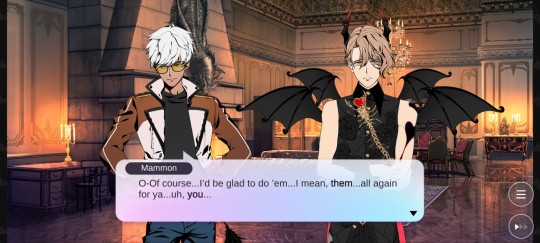
If you don't want to read through the Japanese grammar explanation, just skip to the last section, but for everyone else I'll try to break it all down. Just keep in mind that I'll simplify some things to (hopefully) make it easier to understand for those that don't speak Japanese
Right away, here's the dialogue above in the Japanese version + written in Romaji for those that can't read Japanese:
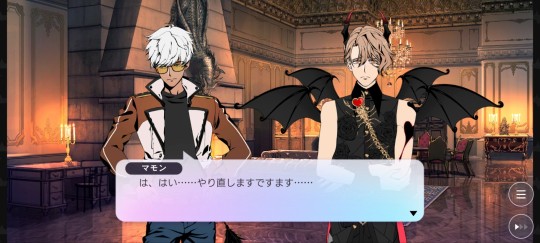

understanding sentence-ending particles
(not really relevant to Mammon's dialogue itself, but I think it'll help make the function of 「です」 ('desu') and 「ます」 ('masu') in the next section a little clearer)
Sentence-ending particles serve to indicate the overall tone a sentence is meant to have. There are a few of them and each one gives the meaning of the sentence a different nuance
The two easiest examples to understand this concept are probably the following:
the 「か」 ('ka') particle basically just a spoken question mark; turns any sentence into a proper question
the 「ね」 ('ne') particle literally functions the same way as 'isn't it'
ちょっと寒い。 ('chotto samui') -> It's a little cold.
ちょっと寒いか。 ('chotto samui ka') -> Is it a little cold?
ちょっと寒いね。 ('chotto samui ne') -> Bit cold, innit? It's a little cold, isn't it?
the auxilary verbs 「です」 ('desu') and 「ます」 ('masu')
Similarly to the sentence-ending particles, these two change the tone of the sentence and are placed at the end. Both make the sentence polite, and depending on what the sentence ends with, you use one or the other. If it ends in a verb, you add 「ます」 ('masu') at the very end, and if it ends in anything else you use 「です」 ('desu')—you cannot use both back to back
Which finally brings us back to Mammon's dialogue

As you can see, he goes a little overboard. Since 「やり直す」 ('yari naosu'; 'to redo') is a verb, the first use of 「ます」 ('masu') is correct, but everything after that is just overkill and wrong but it sounds very cute (The way Mammon speaks here actually reminds me of how half of my classmates used to speak the first few weeks of uni lol)
But yeah, it's definitely not Asmo forcing Mammon to speak differntly since all of the brothers are talking more politely. And given that they're all under Asmo's charm and serving him, it makes sense that they'd adopt a similar manner of speaking as Barbatos. It's just that Mammon is the King of Casual Speech™, dancing gracefully between 'still acceptable' and 'straight up rude' more or less gracefully at least, so obviously he'd struggle with switching to a more butler-like speech style
It's the same with Beel actually. He's usually the type to just cut straight to the point, which is why he also slightly messed up when speaking politely. To me the original Japanese version reads more like a cute little joke that's in line with both their character, that unfortunately got lost in translation since English just doesn't have an equivalent
#i was part of the other half of the class that kept forgetting to use 'desu' at all sdhfhssdhf#also the way i cackled when i read lucifer using 「かしこまりました」#something about it is just so much funnier than 'as you wish'#obey me#obey me nightbringer#obey me spoilers#obey me nightbringer spoilers#obey me mammon#obey me asmodeus#obey me beelzebub#obey me nightbringer mammon#obey me nightbringer asmodeus#obey me nightbringer beelzebub#my stuff
293 notes
·
View notes
Text
The names of the Ruinous Quartet
So I’ve been playing Pokemon Violet and the names of the four Ruinous Pokemon are clearly derived from Chinese, so I thought I’d share some thoughts on what they mean.
The Ruinous Quartet comprise:
Wo-Chien
Chien-Pao
Ting-Lu
Chi-Yu
The first thing to note is that the names seem to use the Wade-Giles system of romanisation, as opposed to the Pinyin system used today. I don’t know Wade-Giles, so I’m going to be translating these to Pinyin for the explanations.
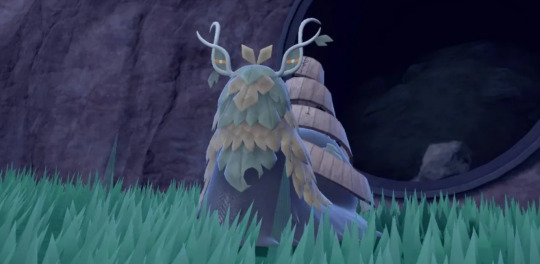
Wo-Chien
The Pinyin equivalent of Wo-Chien is Wo Jian. This doesn’t tell us what the tones are, but the Mandarin name for Wo-Chien according to Bulbapedia is 古简蜗 - Gǔjiǎnwō. 蜗 (Wō) means “snail” (more commonly said as 蜗牛 - wōniú). 简 (Jiǎn) is more difficult to translate because it can take on a lot of meanings depending on context and what words it’s paired up with (it can be a noun, adjective or verb), but in this context it refers to the strips of bamboo that were used for writing in Ancient China before paper was invented. These were strung together so they could be rolled up (kind of like sushi mats lol) when not being read:
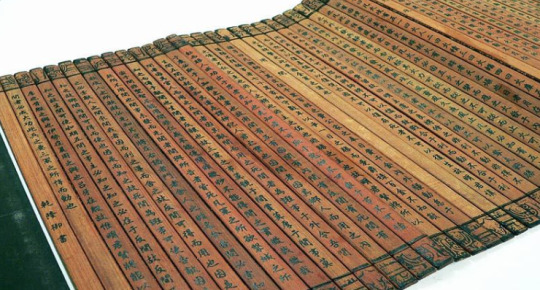
This is why Wo-Chien is the Tablets of Ruin. This version of 简 (Jiǎn) isn’t commonly used anymore, instead it’s more usually used to mean “simple” (简单 jiǎndān).
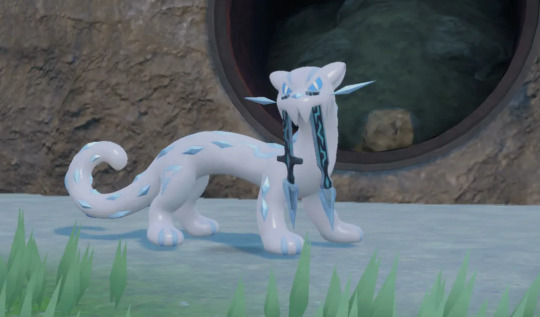
Chien-Pao
This one is fairly straight-forward. The Pinyin of Chien-Pao is Jian Bao. This “Jian” is a different word from the one above referring to the bamboo slips, which was 简 (Jiǎn) - this one is 剑 (Jiàn), meaning “sword”. And Bao here is 豹 (Bào), meaning “leopard” (not buns, which incidentally is 包 Bāo). Hence the Mandarin name for Chien-Pao is 古剑豹 (Gǔjiànbào), meaning ancient sword leopard. So Chien-Pao is literally Sword Leopard, which makes sense as it’s the Sword of Ruin.

Ting-Lu
Ting-Lu in Pinyin is Ding Lu, and the Mandarin name is 古鼎鹿 (Gǔdǐnglù). Lu here refers to 鹿 (Lù), meaning “deer”. Ding refers to 鼎 (D��ng), which are ancient Chinese cauldrons with three legs and two handles (below). This is depicted on Ting-Lu’s head and is why it’s known as the Vessel of Ruin. So Ting-Lu is basically the Cauldron Deer.
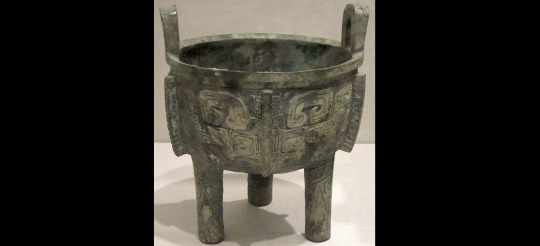
As a bonus, the character 鼎 (Dǐng) can be traced back to a hieroglyphical depiction of the actual cauldron itself (source):
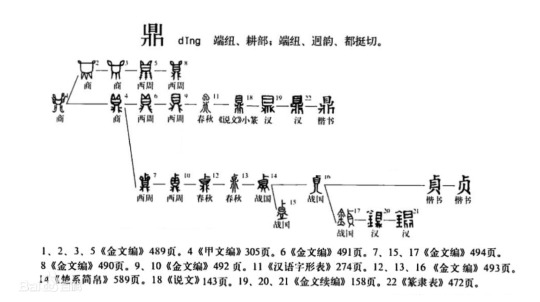
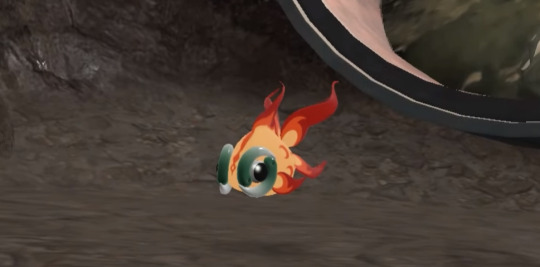
Chi-Yu
This one is a bit of a mystery. The Pinyin for Chi-Yu is Ji Yu. Now Yu is obviously 鱼 (Yú), meaning “fish”, but it’s unclear what character the Ji refers to. All three previous Pokemon’s names derive from the animal and their associated item (tablets, sword, cauldron). Chi-Yu’s associated item are beads, but that translates to 珠 (zhū), not “ji”. The Mandarin name for Chi-Yu is 古玉鱼 (Gǔyùyú), meaning ancient jade fish. This is another example of different Chinese characters being apparently spelt the same but said differently - 玉 yù vs 鱼 yú. Maybe this is why they didn’t go with Jade for the English, both because Yu can stand for both and Yu-yu would look somewhat silly.
One possibility (which is what Bulbapedia goes with) is that Ji Yu is 鲫鱼 (Jìyú), which is a type of carp (note also that Bulbapedia records it as goldfish, but goldfish is 金鱼 jīnyú).
Another (less likely but I think more interesting) possibility is that Chi-Yu isn’t Wade-Giles at all, but just Pinyin, in which case “Chi” could be 赤 (Chì), which is a fancy word for red (红 - hóng), kind of like how you can just have red but if it’s scarlet or crimson then all of a sudden it’s more exciting even though no one’s actually thinking about the precise shade differences. This would fit given Chi-Yu’s fire typing.
Aaaaanyway I hope this has been interesting and happy 2023!
#pokemon scarlet and violet#pokemon sv#pokemon#wo-chien#chien-pao#ting-lu#chi-yu#wo chien#chien pao#ting lu#chi yu#ruinous pokemon#treasures of ruin#x
707 notes
·
View notes
Note
what is something in English (language) that you like (specific words, sounds, turns of phrase, etc) that doesn't exist in French, and the other way around. asking because you write prose in your (second?) language; thank you; hope you had a horsesome mountaincation.
favorite type of question but equally there's so much to be said i don't even know where to begin.... cometh off the top of the dome:
in english that doesn't exist in french:
the sound th in english. inexistant in french, which is why you can recognize a french speaker by the fact that the "th" sound will be switched for a "s", "f" or "z" depending on the word. it's not as sibilant as sss, not as ethereal/light as fff. it can be subdued or it can be overt and wide, baring all the upper teeth, almost animal. it's also very common, so you can very easily use it for alliterations and the like.
an easier time "building" words, especially color-related adjectives, as well as the -ness, and the -less. ironblue eyes. rustred skin. chalkwhite, bloodblue, almost comes naturally to the english syntax due to the position of its adjectives relating to the noun.
the pronoun "it" in the meanings of "it ought to", "it should be", etc. french doesn't have a neutral grammatical gender and all neutral statements that in english are formed around "it ought to", "it is raining," etc are created with "il" (masculine singular), which sometimes just doesn't fit the vibe. doesn't fit the syntax, the atmosphere, the statement, the mood.
verbs that, regardless of tense, are similar in tones and construction enough that you can deploy multiple in a sentence while still keeping a rhythm. french grammar & conjugation is, for that, a headache.
in french that doesn't exist in english:
a distinction between a singular informal you, a singular formal You, and a plural yous (tu and vous). this exists in so many languages and lacks in english. it is so wonderful for all matters of multiplicity, of power struggle (inherently Oneirotects-esque), it is inherently erotic in the way it codifies language between two strangers that get closer. there is a line in P2 where, in the russian version, Burakh slips from formal You to informal you when speaking to Dankovsky, immediately catches himself, and Dankovsky reassures him that no, go on. it has been changed for a curse word slip-up in english, but that decimates imo the change of the power dynamic that is implied with a change between You and you.
the word Cyprine. if you were #there when i wrote my yulieva piece, i was sooo mad about its nonexistence in english i just ended up using it as it exists in french, because all the translations in english are so neutered, bordering on crass, and not even in a sensual way. ptoo!!!
the phrase "entre chien et loup". my fave among all. literally, it means "between dog and wolf". figuratively, it is used to speak about this hour of the evening where the light begins to dip, and all forms and shapes begin looking alike: a light in which you would not be able to differentiate between a dog and a wolf. the "between" also has a double meaning: it is the between of "picking between one & the other", and the between of a physical space that one could inhabit.
an ABUNDANCE of ways to have the sound "eh": é, ée, és, ées, ai, ais, ait, ez, er, aient, ..., and to have them often. this makes it so writing, even without trying, can have a rhythm, pleasant sonorities, assonances. this is something i found when writing PSLR, i was constantly running into the -é- sound, and it ended up giving this "rocking" motion of a boat, of waves... fitting for the subject matter. it is a very easy rhyme/assonance, demands basically no thought, but because it is so simple & common, it gives a sense of pleasant and familiar motion. almost lulling.
off the top of the dome here's what i can find... there's prolly so much more. i could talk about how french is so much more fitted i find to long sentences, to déambulations, to wordy wanderings, to sensible introspection, which Does Not Stop Me from writing this way in english, and reciprocally english is fitted for abrasion, swiftness, for a bounciness that french sometimes lacks, for sentences without a subject that appear like gashes or bruises... i have to learn every language on earth ever.
and THANK YOU + you know it yourself. watch this


37 notes
·
View notes
Text
I see there's In Stars and Time crossover thing going on so I want to join
...Also it's Let Papyrus Say Fuck day and I see this post from @entryn17 and I think... hmm, well why not just, do both of that actually
Read more for... it's not really Isat's spoiler or anything it's just general worldbuilding thing but I'm doing this anyway in case people want to like, experience it blind or something (please do that actually, play it, or even look at playthrough, just not summary or something like that it's much better that way, I say this like how you eat a specific type of food)

(Chara no)
...I speedrun drawing this, kinda... I don't think I'm that good at drawing Siffrin... he's just standing there... oh well, I can improve later
(technically this isn't him teaching swear to a child but it's him teaching swear... and maybe learning some more in the process, even if those're like... crab, and gems)
(...I probably could just use my own language but like I don't feel like making ocs...)
(I also could use like the one thing I want to do where Frisk is Thai but it would be very long and I don't feel like making all that in comics)
(and if it's a fic it would just be a very long infodumping on what I think the word come from and when it might be appropriate... and I have no idea the appropriateness of the English ones for Papyrus to teach it back so I don't think I could do that)
...
Anyway the infodumping anyway, I'm going to use the pinyin/chinese tone indicator for this because I don't know any other one (other than that just say it like English word I guess)
Did you know that one of the Thai swears is just แม่ง (màng) that means your mom. (said really fast it merge the word... also rudely, you pronoun rudely, we have rude pronouns... or really informal, depend on your relationship)
It's used in the middle of a sentence like 'fucking' and things.
there's also a dad version, พ่อง (pòng) the longer version that's used as a curse to kill the opponent's parents... (maybe don't do that) the middle version where you cut the death part and it's a come back like how english use your mom... แม่มึง/พ่อมึง (màe mūng/pòre mūng, maybe add a at the end)
There's also the one for insulting specifically (including the table that you stub your toes on) that means a type of monitor lizard. เหี้ย (hèar) ...it has another name that sounds a lot better that just, means money/silver-gold creature, which is. weird, so do we like it or not??? (money and silver is the same word)
mmmmmm another one that is used in the situation you would say 'oh shit' ชิบหาย (chib hái) direct translation is uhhh... chip-lost????? (I have no idea where it come from, also we don't have past tense verb it's all the same) maybe it's like 'lost your marble' or something I don't even know
there's also one that is pronounced like animal/สัตว์ (sǔt) (pronounced like cut/shut) in Thai but I'm pretty sure it's not the same word, noone knows exactly how to spell it. it's... some kind of insult, not as severe as the lizard monitor though
and uhh, the lower one which is the watered down monitor lizard, เชี่ย where you just change from hèar to chèar
#Undertale#Papyrus#Chara#In Stars and Time#Siffrin#utdr#isat#LetPapyrusSayFuck#advisor swap#swearing#wow the tags are... intertwined...#or something like that I just- yea#my art
28 notes
·
View notes
Text

I’ve realized I’m not as invested in House of the Dragon as I wanted to be, and I mostly feel the strongest emotions when I'm annoyed at other fans— like those who are way, way too invested in the patriarchal ideals of the Seven Kingdoms and those who use the term “girlboss”.
I do enjoy the show, but I'm not feeling strongly except for the dragons.
And I knew dragon material would be minimal, both for budgetary reasons and because the human story is the real meat. But despite the series depending on an Elric homage it turns out I’m just not that interested in high fantasy politicking or that sub-genre in general.
I will say I'm fine with making “teams” out of an ESH narrative, because it’s human nature to make “teams” regardless, and it’s rare to write a story where the author truly sides with nobody—even when their favorite side doesn't "win", the author favors someone.
Funnily, it was GoT that helped me understand that, as I watched this allegedly “neutral” story merely shave away important characters till the true MVPs were left--probably the same ones that GRRM intended.
And while it's hard to believe these days, there was also a time I really did believe the Targaryens were an ironic swipe at stereotypical fantasy and not GRRM's favorite children. Wow.
Anyway, my impression was less that the TV series favored Team Black but that it was doing a slow burn on everything because of adult complexities. The same need to be grounded was why we didn't see the direct aftermath of Luc's death.
And that just because characters don’t literally say things aloud (Daemon sanctioning some child murder) or intend bad things to happen (Ser Steffon getting toasted wasn't on Nyra's order but it was "for her") or point out something is bad (did viewers really think the prophecy was supposed to mean the Targs were the good guys all along?) doesn't mean the narrative’s been sanitized.
However, I was ready for something fun to read when word of Martin's dislike of HotD came out, but when I expected to "popcorn" (remember when that was a verb?) I found out I _could_ get invested.
For some reason (maybe it is her NA aspect) I have a bee in my bonnet about perceiving TV Helaena as less caring simply because of her flat affect, and that was ultimately what this was about.
To be blunt, I don't find the changes to Blood and Cheese to be defanging anything--the original actually seemed a bit over-the-top by comparison.
And I'm having a bit of trouble seeing how what's in the TV series is //not// horrible enough that (WATCH THIS SPACE).
And TV Helaena first offering a necklace--dear God, that doesn't mean she only thinks her kids are worth that much. It's the heaven-forbid-characters-act-irrationally canard again. And freezing up is just as gut-wrenching as breaking down.
In short, I do not see this as the Le Epic Dunk but instead a writer being a bit precious.
I took a lot more issue with Alicent surrendering, since I thought she was the type to double down on her ideals when they start to creak. And sometimes mature storytelling includes characters _refusing_ to change. That is what might cook the show’s goose, but we’ll see in two years.
#dragons#dragon#house targaryen#helaena targaryen#hotd#house of the dragon#blog#hotd meta#also i dont take nyras word that helaena dislikes ridimg by itself
15 notes
·
View notes
Text
Why learning mandarin is not that hard, if you were considering studying it but scared (this post is partly joking, in that any language could be easier for you to learn than another, and it depends on the individual, so you may not find these aspects as easy or vice versa you might think another language's aspects i found hard were easier for you. Also, if you've studied or tried to study japanese then in particular these aspects compared are going to be more familiar)
1. You're scared to learn hanzi. There's 4000 you say. They look hard! Well some happy news: hanzi are made up of 214 radicals put together (like letters) to make 1 sound-meaning piece (so like how c a r are put together to mean CAR). The sound meaning piece is hanzi. Each hanzi usually has 1 pronunciation (compared to english which often pronounces syllables multiple ways). Each hanzi is like 1 syllable or word-part. Many hanzi are 1 radical that's related to it's pronunciation, and 1 radical roughly related to it's meaning. (With some exceptions, like with any language). Examples: 人 认 任 仁 仞 all have the person radical 人 "ren" (which looks like a diagonal line with a straight line down, when it's put on the side of hanzi), all of these hanzi are "ren" like the radical, with different meanings (which the other radical hints at). So 人 means person, since it's just the person radical. 认 means to know someone, and the meaning radical on the left is the smushed radical 言 that means speech. As you get used to seeing hanzi, you'll notice that you can often guess the rough pronunciation (at least enough to see 吧 ba and then later see 把 疤 靶 and guess that if you type "ba" you can look them up, since they all share 巴). You'll often be able to start guessing new words based on the meaning radical, and hanzi you already know. There's some hanzi which are just one radical, like 人 person, 女 woman. Many of these are like the 214 radicals, and the radicals are the main thing you'll need to memorize. I know 216 feels like a lot. But once you practice identifying those 214 radicals, new hanzi become much easier to remember because you can recognize how to make them and what information they might contain about meaning and pronunctiation. If you learn 手 shou is hand and it looks like 扌when it is a radical, then you can start figuring out 把 and 拉 may have something to do with hands or using them. Many verbs that people do, have the hand or foot radical. Here's a list of the radicals:
Most words are 2 hanzi put together (similar to english driveway, airport, steering wheel, cross walk, coffee cup, inter-nation-al, extra-terrest-rial) with the sound-meaning hanzi contributing to build a new word. There's some 1 hanzi words, like person 人. There's some 4 hanzi words and phrases. You'll learn hanzi and over time, that will result in learning or being able to guess MANY MORE WORDS beyond just the number of hanzi you've learned. If you learn 清 qing means clear, you'll see new words like 清晰(qingxi distinct, clear) 清楚 (qingchu be clear about/understand), 清除 (to clear away, eliminate), 清新 (pure and fresh, original), 清洁 (qingjie clean). If you guess "something to do literally or metaphorically with "clear" then you may figure out the words with 清 in a show or novel, if you know the other hanzi then you'll then learn to guess even more words.
Once you learn a few hanzi, it opens up the understanding of many words. Then as you learn more, the words you can guess expands a lot. You can rely on radicals in hanzi to help you guess what pinyin to type to look a hanzi up, and what general area a hanzi might relate to in its meaning (like the water radical 氵in 海 冰 池 indicating these hanzi may be related to water).
2. The grammar! Is it hard? Now this will depend on what you prefer. Mandarin has no conjugation. I hate conjugation. This means when you learn a word? You can recognize the word in all contexts. You don't need to learn several versions of "to run" in mandarin, it will always be pao 跑. There might be similar words, like in english dash/sprint/run etc. But you're not memorizing run/ran/running. You learn 跑, and you'll recognize it in the past, present, future, and with whoever is saying it. In contrast to say japanese where 分かります (わかります) 分かりました 分かった 分かるない 分かるなかった 分かりませんでした are all "understand" in different verb conjugations and levels of politeness. 明白 (understand mingbai) is the same whether its I understand 我明白, i understood 我明白了, 我会明白 (i will understand that... although id use liaojie or zhidao probably). In chinese you may use another word for tense, like english says "i will go/i have gone" and 会,要,了, 过 show up in those sentences. And there is 的 得 地 which have grammar functions. But there's no conjugation. The sentence order is also generally subject verb object, if you're an english speaker then the overall word order will be familiar and make it less of a hurdle to get used to other grammar differences. For me, the biggest hurdle (with japanese) was and still is the word order in sentences, and it's taken me years of practice to get familiar enough to interpret sentences i hear as i hear them. For me, french's biggest hurdle was conjugation (and still is if i have to write). So in those regards, mandarin can be quite approachable.
3. Tones! What can I say. There's a lot of good youtube videos that explain the 4 tones and neutral tone, tone sandhi (tone changes), and how tone pairs may be easier to study with. It is definitely new if you don't already know a tonal language. But it is also something you can practice listening to, and get better at hearing. It is something you can get used to recognizing in months, it may not take you years. There are hurdles with speaking, but people who learn english have to learn where to put the emphasis in pronuncing multi syllable words (along with learners of french and german and spanish). Practice, shadowing, and working on where you struggle, are part of it just like any language. I've found these pages very helpful: dong-chinese has a Pronunciation guide under Learn Pinyin, and if you go through it and do the practice tests it can help a lot with listening skills:
And this site Accent Lab has tone pair drills. I really like this exercise, as tone pair recognition helps a lot with recognizing words:
15 notes
·
View notes
Text
🥛Flip!Mob headcanons
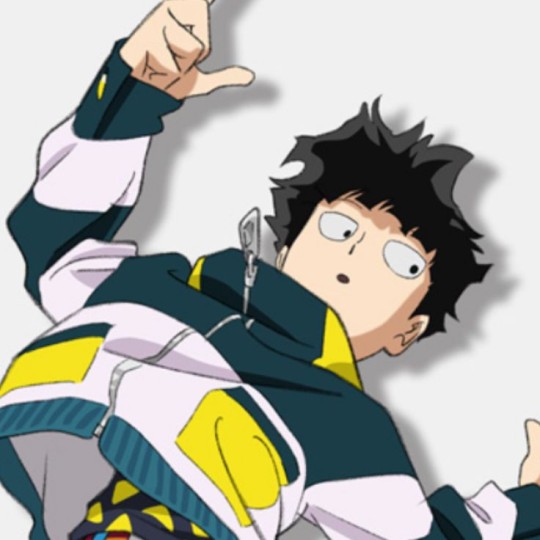


🥛a/n | honestly because why not. He's so Flip coded to me so have some Flip hcs of my favorite boy:D
🥛 cws | bugs (ants mention)
Prns — he/him
Role — Flip!big brother cg, baby and older kid regressor
Age — little: 4-9
Verb status — verbal

🧮 Cg hcs
🥛: definition of a teddy bear. Basically, a very sweet and ideal cg if you're more on the low energized side.
🥛: speaking of low energized littles, he works amazing with littles who do little/nothing when they're little. Since he's a little low-energized himself; he'll know how to work with you if you are. If not, that's okay too! He flexes very well when he's in caregiver space
🥛: bored? He'll suggest some things to do! Of course he suggests things that requires not alot of spoon energy (unless ofc you're more active then he will suggest that instead) but things like napping, watching movies/shows/cartoons or coloring is always on his top suggestions list. If you ask, he'll take you to the park and let you loose to do what your hearts content. (Of course he still watches over you to make sure you don't get hurt)
🥛: at the park: if he's involved and not just sitting on the benches he'll suggest the swing! If you wanted to he will push you on the swing. If you're a bug lover little, he'll watch anthills with you
🥛: kinda basic on petnames but will call you things like kiddo and bud. But he's open to suggestions as well. He also prefers if you call him things like big brother, baba, bubby, etc etc..
🥛: if you two were in public he'll always hold your hand if necessary. He doesn't want his little one to wander off out of his sight afterall.
🥛: loves to build pillow forts with you. In the end you both could sleep in it if you wanted to
🥛: works surprisingly well for nonverbal / semi verb littles. Since he's more observant with body language: he'd understand what you need and want
🥛: constantly visits the library if you ever wanted him to rent out your favorite movie to watch (or a few, sometimes he gets a couple movies for you)
🩹 Little hcs
🥛: just a sleepy boy. He always needs a nap.
🥛: not much changes from how he is when big. Low energized and overall quiet baby who prefers to be alone most of the time.
🥛: doesn't have a caregiver, nor does he think he needs/want one. He is perfectly capable of taking care of himself no matter his little age. Though he welcomes occasional babysitters and/or playmates.
🥛: doesn't have much gear but he owns a black bat themed sippy cup. Ofc his favorite little drink is milk and varieties (bc why not)
🥛: he mostly sleeps when little. Literally 80% of his schedule is napping. He can nap for hours and hours and wake up even more tired by the end of it. If he's not asleep at home he's outside collecting bugs or coloring during his spare time
🥛: honestly if he had a playdate with pet regressors he'd get along with puppy regressors 100%. Also kitty regressors if they're as energetic as he is
🥛: doesn't really like being babied but it mostly depends on the time of day. At night he encourages you to baby him but if it's during morning or in the noon he'll disprove of it
🥛: the only petname he likes to be called is: kid. Otherwise you can just call him by his nickname. he doesn't mind.
🥛: eats everything in sight so it's recommended you keep things that he shouldn't put in his mouth away from him. Specifically chalk, grass and any type of glue
#sfw agere#agerespace#fandom agere#agere blog#sfw blog#agere headcanons#mob psycho agere#mob psycho 100 agere#mp100 agere
29 notes
·
View notes